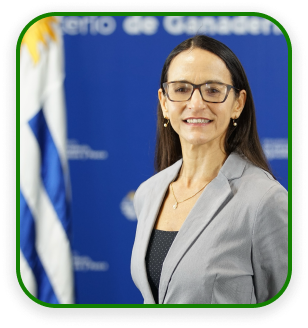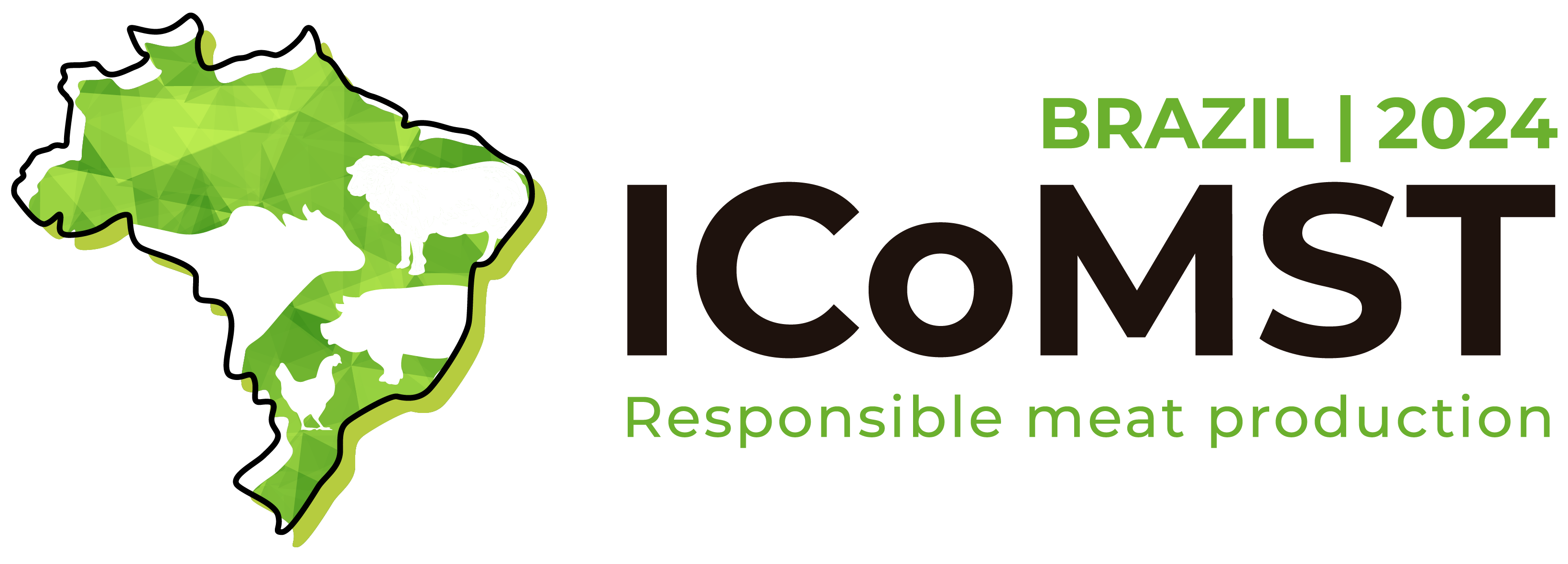
Session 1: Responsible Meat Production
Fernando Sampaio Brazilian Association of Meat Exporters - Brazil
Agronomical Engineer, graduated from the Luiz de Queiroz College of Agriculture (1997), with a specialization in the meat and milk market from the École Supérieure d'Agriculture d'Angers in France. Sampaio has a rich international background, having worked in the meat market in France at Société des Viandes Bretagne Anjou – Soviba (2000 to 2001), and sat Meat Import Zandbergen Brothers BV (2001 to 2008). In 2009, he assumed the role of Sustainability Coordinator at the Brazilian Association of Meat Exporting Industries – ABIEC. His tenure extended from 2011 to 2016, during which he played a pivotal role in institutional representation, international negotiations, and commercial promotion, while concurrently advancing the sustainability agenda. Notably, Sampaio was instrumental in the formation and leadership of the Sustainable Livestock Working Group – GTPS from 2015 to 2016. He also contributed to the Global Roundtable for Sustainable Beef – GRSB and served on the Sustainability Committee of the International Meat Secretariat - IMS. In October 2016, Sampaio transitioned to the role of Executive Director of the Produce, Conserve, Include Strategy, a jurisdictional sustainability initiative in the State of Mato Grosso. His efforts in this role paved the way for a new phase with the establishment of the PCI Institute in early 2019. Starting from February 2023, Sampaio returned to ABIEC, taking on the position of Director of Sustainability. His extensive experience and commitment to sustainable practices continue to make a lasting impact in the industry.

Session 2: Sustainability
Alexandre Berndt Brazilian Agricultural Research Corporation (EMBRAPA) - Brazil
Holds a degree in Biological Sciences from the University of São Paulo - USP (1993), a degree in Agronomic Engineering from ESALQ/USP (1998), a Master's degree in Animal Science and Pastures from ESALQ/USP (2001) and a PhD in Ecology of Agroecosystems from USP ( 2005). He exercised professional activity in Environmental Management in a multinational company. He was a scientific researcher at the Animal Science Institute of APTA-Agência Paulista de Tecnologia dos Agronegócios between 2007 and 2010. He is currently a researcher at EMBRAPA Sotheast Livestock in São Carlos, SP. He has experience in Animal Science, with emphasis on Sustainable Animal Production Systems, working mainly on the following topics: animal nutrition, nutritional requirements, meat quality and methane production in cattle. He participates in the Technical Committee of the Ministry of Science, Technology and Innovations - MCTI for the preparation of the National Inventory of Greenhouse Gas Emissions. He participates in the FAO Livestock Environmental Assessment and Performance Partnership-LEAP enteric methane working group. He participated in the Steering Committee of the LANDMARK Research Network of the European Union. He represents Embrapa in FAO's GASL-Global Agenda for Sustainable Livestock. Between 2016 and 2019 he held the chair of the international committee of the Conference on Greenhouse Gases and Animal Agriculture-GGAA, holding a meeting in Brazil in August 2019 (www.GGAA2019.org). He is a report reviewer for the IPCC and the World Bank. He served as Deputy Head of Research and Development at Embrapa Southeast Livestock between January 2014 and August 2021. He is currently Chief General of Embrapa Southeast Livestock and Vice President of the Brazilian Society of Animal Science.

Session 3: Animal Welfare
Marcia del Campo Gigena Instituto Nacional de Investigación Agropecuaria – Uruguay
Marcia holds a degree in Agricultural Engineering from the Universidad de la República, Uruguay (1994). She earned her master's degree in Advanced Studies on Meat Quality from the Universitat Politècnica de València (2007) and completed her Ph.D. in Animal Welfare and Meat Quality from the same institution in 2009. Since 1994, she has served as the principal animal scientist at the National Institute of Agricultural Research. Currently, Marcia holds the position of President of the Directing Council of the National Institute of Animal Welfare (INBA) within the Ministry of Livestock and Agriculture (MGAP URUGUAY), a role she has held since its establishment in July 2021. Additionally, Marcia actively engages in livestock farming in the northern region of Uruguay.
Furthermore, Marcia has made significant contributions to education, having taught over 70 courses on Animal Welfare and Beef Quality in Uruguay and abroad over the last six years. She has also provided guidance to more than 50 students at both the undergraduate and graduate levels. Her scholarly output includes over 130 articles and contributions to national and international scientific events. Marcia has delivered more than 90 conferences in Uruguay and around the world. Since 2011, she has been responsible for the Ethical Commission for the Use of Experimental Animals at INIA Uruguay.
Marcia is a Guest Professor at the Public University in Uruguay, Faculty of Agronomy (since 2008) and a lecturer at São Paulo State University (since 2013). Additionally, she serves as the ICoMST contact person in Uruguay and is a member of various national and international working groups and scientific committees, including the World Organization for Animal Health (OMSA), the International Meat Secretariat (IMS), and the American Meat Science Association (AMSA).

Session 4: Genetics & Physiology
Andrzej Sosnicki GenusPIC / USA
Andrzej Sosnicki received his MS in Biology-Animal Physiology and Ph.D. in Agricultural Sciences-Muscle Biology & Meat Science, from University of Life Sciences in Poznan, Poland.
Andrzej’s academic carrier includes appointments at: Department of Zootechnical Sciences, University of Life Sciences, Poznan, Poland; Muscle Biology & Meat Science laboratory, University of Wisconsin, Madison; Department of Zoology, University of Tennessee, Knoxville, and Department of Biology, University of Pennsylvania, Philadelphia. His academic research focused on skeletal muscle morphology, pathology and meat quality, and he studied physiological principles of skeletal muscle function during locomotion. Andrzej also held Adjunct Associate Professor positions at Department of Animal Science, Iowa State University, Ames, IA in 2002-2010, and at Department of Animal & Avian Sciences, University of Maryland, College Park, MD in 2016-2019.
Andrzej’s industry experience begun in 1990 at the R&D Department of Oscar Mayer Foods Corporation/Kraft Foods, Madison, WI, where he managed research focusing on creating value in vertically integrated poultry & pork production and meat processing systems. In 1995 he joined PIC to establish and manage the company’s Muscle Biology & Applied Meat Science endeavors emphasizing the commercial importance of pig carcass and meat quality traits in the PIC’s genetic improvement program. Over the years he has held several technical and P&L/commercial positions in North and Latin America and in the EU. He is currently Director of Global Technical Projects focusing on further integration of pig skeletal muscle growth-physiology and meat quality into the matrix of GenusPIC’s genetic improvement program.
Dr. Sosnicki is the author/co-author of over forty publications, six book chapters and several scientific abstracts. He received the American Meat Institute Distinguished Extension-Industry Service Award in 2013 and the American Meat Science Association International Lectureship Award in 2015.

Session 5: Muscle biology & Meat quality
Tracy Scheffler University of Florida / USA
Tracy’s academic carrier includes appointments at Virginia Tech as Lab Specialist and as Assistant Professor in the Department of Animal Sciences, at University of Florida, where now she is Associate Professor in muscle biology. She is the lead instructor for Experimental Techniques in Meat Science, which exposes students to laboratory methods in meat science and muscle biology. She also teaches part of Meat Technology course, that covers topics in meat science from muscle structure, growth, and meat quality development to microbiology and food safety. As a researcher, the overall goal of Dr. Scheffler’s research is to optimize muscle growth, composition, and meat quality. In particular, she is interested in how muscle phenotype, metabolic properties, and energy signaling pathways influence the following; protein turnover and growth of skeletal muscle, and impact on production parameters, such as lean gain, nutrient partitioning and muscle and whole body composition, and the conversion of muscle to meat and development of meat quality attributes. During her career, Tracy won great number of awards: Outstanding Dissertation Honorable Mention in Science and Engineering, from Virginia Tech in 2013, E.T. Kornegay Outstanding Ph.D. Student Award from the Department of Animal and Poultry Sciences, Virginia Tech in 2011, Featherston Early Graduate Career Award from the Department of Animal Sciences, at Purdue University in 2008 and also a Featherston Graduate Student Award for Outstanding Teaching, Department of Animal Sciences from Purdue University in 2005. Her scientific contributions are abundant as she author/co-author over forty scientific papers, including recent reviews related to Bos indicus beef quality. Among her publications, there are also book chapters as well as lab protocol. Most recently, in 2021 Tracy won an Achievement Award by the AMSA due to her dedication to cutting-edge research on improvement of the quality and palatability of beef from Bos indicus influenced cattle.

Session 6: Meat safety
Mindy Brashears Texas Tech University / USA
Mindy Brashears is the former Under Secretary for Food Safety at the U.S. Department of Agriculture. She was nominated by President Donald J. Trump and confirmed by a Senate vote on March 23, 2020 and concluded her service on January 20, 2021. Her responsibilities in this role included leading the nation's Food Safety and Inspection Service (FSIS) and its team of over 10,000 food inspectors and scientists. She chaired the Codex Alimentarius Policy Committee, which made her the highest-ranking food safety official in the U.S. government during her tenure. Following her time at USDA, she returned to her role as Professor of Food Microbiology and Food Safety at Texas Tech University where she is the director for the International Center for Food Industry Excellence.

Session 7: Objective measurement of carcass and meat quality
Graham E. Gardner Murdoch University – Australia
Graham's research focuses on physiological responses to selection for growth, leanness and eating quality within the sheep, pork, and cattle industries, and the development of technologies that measure these traits. Graham is the Chief Investigator of the Advanced Livestock Measurement Technologies Project (ALMTech) which is a national collaboration focused on the development & commercialisation of objective carcase measurement technologies. Within Australia this project has driven the development and roll-out of a range of different technologies that measure lean meat yield and eating quality in livestock.

Session 8: Industry session

Session 9: Meat products development
Mustafa Farouk AgResearch – New Zealand
Dr Mustafa Farouk is a Senior Meat/Food Scientist in the Food Technology and Processing Group of AgResearch Ltd, Hamilton, New Zealand. His research activities help build platforms for technologies and industry engagements to support the creation and export of high-value meat-based ingredients for manufacturers, and protein-rich functional foods for consumers having optimised nutritional composition, organoleptics, and physiological benefits. He graduated with a Masters and PhD in Food Science from Michigan State University, USA. His Research interest is in exploiting the functional properties of muscle proteins for gelation and texturization purposes; non-traditional uses of meat proteins, halal meat and food production, quality of manufacturing beef; adding value to red meats and meat products; and improving the understanding of meat as a central ingredient in foods. Farouk is a member of many professional bodies and sits on the advisory committees of governmental and non-governmental organizations related to foods, and has published extensively on meat and meat products.

Session 10: Meat products stability
Luca Simone Cocolin University of Torino/ Italy
Luca Simone Cocolin is a distinguished academician holding the position of Full Professor in the Department of Agricultural, Forest and Food Sciences at the University of Torino, Italy. He has authored over 300 publications in peer reviwed journals. His expertise spans diverse domains, encompassing the development, optimization, and application of molecular methods for detecting, quantifying, and characterizing foodborne pathogens. Additionally, his research delves into the microbial ecology of fermented foods, bioprotection, and the study of the human microbiome.
Institutionally, Professor Cocolin has assumed significant roles, including his current position as the President of the Degree Course on Food Science and Technology since 2015 at the University of Torino. He has been a stalwart member of the Management Board of the PhD in Agricultural, Forest and Food Sciences since 2010 and has actively contributed to the Orientation, Tutoring, and Job Placement Committee of the Department of Agriculture, Forest and Food Sciences since 2008.
Since 2001, Professor Cocolin has played pivotal roles in numerous national and European projects, serving as a project or research unit coordinator. Furthermore, his editorial contributions include being the Editor in Chief of the International Journal of Food Microbiology since 2008, Academic Editor of PLOS One since 2016, and a member of various editorial boards, attesting to his commitment to advancing scientific knowledge.
Demonstrating his global engagement, Professor Cocolin has been an Executive Board Member of the International Committee on Food Microbiology and Hygiene (ICFMH) since 2008, contributing to the International Union of Microbiological Societies (IUMS). His involvement extends to leadership roles in the European Technology Platform Food for Life, the Scientific Advisory Board of Arla Foods Dairy Health and Nutrition Excellence Center, and the EIT Food initiative.
Moreover, he has lent his expertise to numerous international research project evaluations for esteemed organizations such as the French National Research Agency (ANR), the Research Foundation Flanders, the Istitut National de la Recherce Agronomique (INRA), the Skolkovo Foundation, the Vienna Science and Technology Fund (WWTF), and various Italian ministries and agencies.

Session 11: Meat and Health
Stefaan De Smet Ghent University - Belgium
Stefaan De Smet graduated in 1986 as an Agricultural Engineer from Ghent University, specializing in Animal Production. Since 1987, he has been associated with the Department of Animal Production at Ghent University. Initially, he joined as a PhD student and later served as a research project assistant and post-doctoral scientist before assuming the role of an assistant professor. His research interests are related to the domain of meat quality, with a keen focus on understanding the correlation between carcass quality and sensory and technological traits of meat quality. Presently, he holds the position of a full professor in Animal Science at Ghent University, Belgium. In this capacity, he is responsible for teaching both general and advanced courses in Animal Production, Animal Breeding, and Meat Science. His ongoing research is dedicated to exploring meat quality and the health value of meat and meat products, with a specific emphasis on optimizing the composition and oxidative stability of meat from different species. Stefaan De Smet also serves as the current president of the Belgian Association of Meat Science and Technology (BAMST). As an accomplished academic, he is (co-)author of over 150 scientific publications in peer-reviewed journals. Additionally, he actively contributes to the academic community by regularly refereeing manuscripts for several journals.

Session 12: Industry session – From processing to consumer

Session 13: Consumer topics
Maria Font i Furnols IRTA - Spain
Maria Font i Furnols is MSc Agriculture Engineer (1995), MSc in Food Science and Technology (1997) and MSc in Psychology (2011). She obtained her PhD in 2000 in the Department of Statistics and Operative Investigation of the Polytechnic University of Catalonia working in an European project about boar taint mainly in trained panel and consumer aspects. She works as researcher at IRTA since 2000 and nowadays belongs to the program of Food Quality and Technology. She works in carcass grading, carcass quality and meat quality considering aspects related to the productive system and the characteristics of the animals and in consumer studies. She has used the computed tomography to evaluate the body composition of life animals, carcasses and cuts. She has participated and lead several national and international projects. She has more than 100 scientific publications and more than 50 technical papers, as well as several book chapters.

Session 14: Meat science communication
Declan Troy TEAGASC/ Ireland
Declan completed his post graduate studies at University College Dublin in 1986 investigating the biochemistry of muscle proteases as a function of pH. He later became Head of the Meat Science Department in The National Food Centre, Dublin. During this time he has published over 150 scientific peer reviewed publications, book chapters and scientific articles, mainly in the area of meat quality. The main focus of his research is on the biochemistry of muscle proteins and their role in meat tenderness. Declan has always encouraged the up-take of science based innovations by the food industry and has interacted widely with the sector to this end. He has collaborated in his research programme with many different research groups from Europe and all around the world including Australia, Korea, New Zealand, Uruguay, China, Brazil and of course the USA.
Declan has fostered highly successful international collaborations and exchange of knowledge in food science by leading research projects worth more than €80 million that supported 125 PhD students globally in different laboratories at collaborating institutions funded nationally and internationally. Most recently he has been appointed as the Director of the Consumer Food Centre in Teagasc.
Declan sits on many national and international committees formulating research priorities in food science and advising state agencies and companies. He is currently a member of the UNECE Working Group on Meat Quality. He was Chairman of the World Congress of Food Science and Technology 2016 (IUFoST 2016) in Dublin in his capacity as President of the Institute of Food Science and Technology of Ireland. He has also been appointed the International Secretary of the annual International Congress of Meat Science and Technology (ICoMST) of which he was chair both in 2006 (Dublin) and Cork (2017) and he is Academic Lead to Meat Technology Ireland (MTI). Currently he is manages the Teagasc Research Centre in Ashtown, Dublin.
